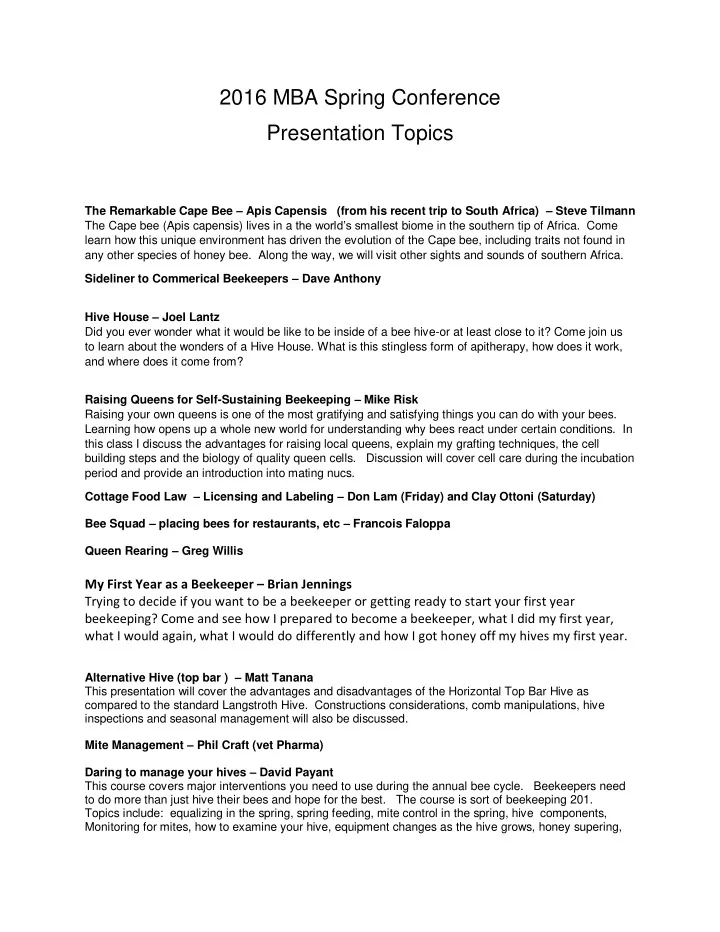

2016 MBA Spring Conference Presentation Topics The Remarkable Cape Bee – Apis Capensis (from his recent trip to South Africa) – Steve Tilmann The Cape bee (Apis capensis) lives in a the world’s smallest biome in the southern tip of Africa. Come learn how this unique environment has driven the evolution of the Cape bee, including traits not found in any other species of honey bee. Along the way, we will visit other sights and sounds of southern Africa. Sideliner to Commerical Beekeepers – Dave Anthony Hive House – Joel Lantz Did you ever wonder what it would be like to be inside of a bee hive-or at least close to it? Come join us to learn about the wonders of a Hive House. What is this stingless form of apitherapy, how does it work, and where does it come from? Raising Queens for Self-Sustaining Beekeeping – Mike Risk Raising your own queens is one of the most gratifying and satisfying things you can do with your bees. Learning how opens up a whole new world for understanding why bees react under certain conditions. In this class I discuss the advantages for raising local queens, explain my grafting techniques, the cell building steps and the biology of quality queen cells. Discussion will cover cell care during the incubation period and provide an introduction into mating nucs. Cottage Food Law – Licensing and Labeling – Don Lam (Friday) and Clay Ottoni (Saturday) Bee Squad – placing bees for restaurants, etc – Francois Faloppa Queen Rearing – Greg Willis My First Year as a Beekeeper – Brian Jennings Trying to decide if you want to be a beekeeper or getting ready to start your first year beekeeping? Come and see how I prepared to become a beekeeper, what I did my first year, what I would again, what I would do differently and how I got honey off my hives my first year. Alternative Hive (top bar ) – Matt Tanana This presentation will cover the advantages and disadvantages of the Horizontal Top Bar Hive as compared to the standard Langstroth Hive. Constructions considerations, comb manipulations, hive inspections and seasonal management will also be discussed. Mite Management – Phil Craft (vet Pharma) Daring to manage your hives – David Payant This course covers major interventions you need to use during the annual bee cycle. Beekeepers need to do more than just hive their bees and hope for the best. The course is sort of beekeeping 201. Topics include: equalizing in the spring, spring feeding, mite control in the spring, hive components, Monitoring for mites, how to examine your hive, equipment changes as the hive grows, honey supering,
drone comb for mite control, honey harvesting, fall feeding, winter set up for the far north, queens and queen introductions, on the spot queen rearing, splitting and merging. Nicot method of raising queens – David Payant The Nicot box method gets your queen to lay eggs directly in cell cups thereby avoiding the tricky and frustrating grafting method of obtaining larva for queen rearing.This course covers the basics of queen breeding and bee reproduction. There is information on queen genetics. A discussion of how to get your queen to lay eggs in the Nictot box is given. Anatomy of the bee – Microscope class – Zachary Huang (microscope classes both days) Catching Swarms – Matt Tanana This presentation will cover the construction and use of Swarm Traps (aka bait hives). Techniques for successful employment, baiting, and recovery will be given. The biology of a swarm, as it relates to catching feral bees, will also be discussed. Hive Management – Mike Risk Bee Removal from Structures – Charlotte Hubbard Capturing a swarm or removing a colony from a structure may seem like getting bees for free, but there’s time, equipment, skill and risk. This session will review some essentials, tips and real-life experiences What we wished we’d known in the BEEE -ginning – Charlotte Hubbard Over 1,000 beekeepers were asked what they wished they’d known when they started that would have helped with the steep learning curve. Top items and practical information is shared. Ideal for understanding some of the challenges you’ll face and the rewards, presented in a fun, lively approach. Apitherapy – Kristine Jacobson (Saturday only) Part 1: Learn the medicinal uses of bee venom, propolis, royal jelly, pollen and honey. Part 2: Actual case history of examples of BVT used with MS, arthritis, chronic pain, wounds and many other auto-immune disorders. Includes live demonstration of how to sting. Antibiotics and Mite Kit- – Walter Pett Pests and Pathogens – Meghan Milbrath Making splits – Nathan Snyder – Saturday only Dissecting for Nosema and tracheal mite – Microscope Class – Meghan Milbrath (classes both days) Beginners Track – Dale Woods, Kay Barber, Cindy Dudock -(both days) Using corporate social responsibility to increase your bee business - Jean-Francois Faloppa I would like to share with other beekeepers the steps I took to create the Honey Bee Squad, that is a hive leasing/ training program directed mostly for corporations. I want to share how the idea came about, and
how rewarding the program can be for all parties involved since that increases the number of hives in an area, increases bee awareness since part of the program is teaching and sharing, increases the beekeeper’s bottom line. I will share how I tied in with the food industry and share the resources to get there ( Am erican Culinary Federation) and share the results so they may decide if it is an avenue they’d like to follow. I have hives at a few country clubs, restaurants, private customers and even the GM headquarters downtown Detroit ( and GM plans to increase it to other locations).
Recommend
More recommend